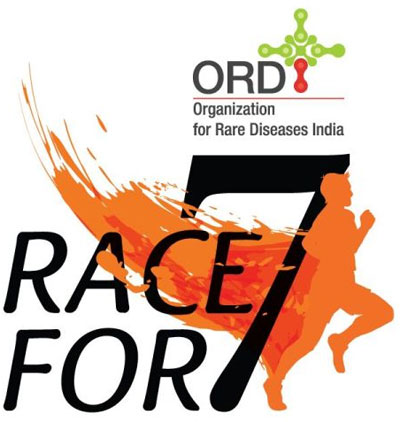It is possible to live a fairly normal life with a rare disease, may be difficult but certainly not impossible.
While most of us don’t know much about rare diseases, The Organization for Rare Diseases India (ORDI), a not for profit organisation committed to addressing the challenges of the rare disease community in India, on Wednesday, announced ‘Race for 7’, a multi-city run/walk to raise funds and awareness for rare disease patients in India.
‘Race for 7’ symbolically represents 7000 rare diseases with 7000 people running for 7 kilometres to represent the average number of years it takes to diagnose a rare disease. The run is being organised in New Delhi on March 17th at the Institute of Genomics & Integrative Biology (IGIB) Mathura Road at 6:30 am.
Although an estimated 1 in 20 Indians suffers from a rare disease, lack of awareness and information has created several challenges for patients and their caregivers, most importantly delayed diagnosis, affordable and targeted care and treatment and access.
Besides members of the general public, several rare disease patients and their families will participate in ‘Race for 7’ to draw attention to the challenges they face and the need for governments and other institutions to recognize their unique needs and create enabling policies and a more supportive environment for them.
Shambhavi Ravishankar, a survivor of one such rare disease called Alagille Syndrome, opened up about the disease, the challenges faced by her and also shed light on how such races can help in spreading awareness.
“I have Alagille Syndrome, it is a rare disease, discovered in the 1970s. It is a genetic disease but in my case it was not hereditary. I was born with it and it tends to affect your heart, liver and kidney at most. It also affects your growth, lowers immunity and leads to a lot of developmental issues,” Shambhavi told ANI.
“It affects my liver and heart primarily. I have a paucity of bile ducts, a ventricular systole defect, and pulmonary stenosis. I have had major surgery on my spinal cord due to a blood clot forming in the neck region of the spine. There is no cure for what I have and most children tend to die by the age of 10 because they don’t get the proper nutrition or intervention,” she added.
Since there is no cure, the people with the syndrome are put on an intensive diet plan which includes consuming a lot of protein which helps in boosting growth and also taking medicines regularly.
“Every day I live with chronic fatigue and chronic body pain. I get breathless and have chest pains some days. Getting a diagnosis was very difficult. I was finally diagnosed at the age of 6 and half with Alagille Syndrome (ALGS). So for almost 6 years I struggled to manage the symptoms and my growth was a big challenge,” Shambhavi said.
She also added that, “I have managed to live with it and to handle it better. I practice yoga everyday and take care of my diet in order to cope with the challenges of the disease.”
Having grown up with a rare disease, Shambhavi’s commitment to fighting for the rights of persons living with rare diseases led her to study law.
Talking about the ‘Race for 7’ initiative, Shambhavi said, “I am also participating in the race, I’ll probably walk, I can’t because of my heart but I enjoy walking.”
The theme for Rare Disease Day 2019 is ‘Bridging health and social care’, focusing on the need to better coordinate all aspects of care to improve the lives of people living with a rare disease.
What started as an awareness walk to commemorate World Rare Disease Day in February 2016 has now grown into a significant campaign, conducted simultaneously in multiple cities and two countries – India and the USA.
Over the years, the run has expanded and in 2019 it will be conducted over February and March across 10 Indian cities – Bengaluru, Mysuru, Chennai, Kolkata, Mumbai, Coimbatore, Bikaner, New Delhi, Thiruvananthapuram and Kochi.
Prasanna Shirol, Founder Director, ORDI, and father of a rare disease patient, said, “Besides, lack of access to early intervention and treatment because of the lack of widespread awareness about rare diseases, the cost of treatment where available is often prohibitively expensive. We urgently need national and state policies that address the unique requirements of the rare disease community and enable them to lead lives of dignity and self-worth. We also need institutions like corporates and schools and colleges to create a more inclusive environment for rare disease patients.”
Prasanna also stressed on the importance of having a rare disease policy and an Orphan drug Policy for holistic management of Rare Diseases for patients, in absence of any health care policy insurance coverage and to support the Industry to develop newer drugs and research respectively.
Dr. Vinod Scaria, Senior Scientist at IGIB said, “This will significantly increase the awareness on genetic diseases. Many of these diseases are actually very prevalent in the Indian population and the race would increase awareness of them among the public.”
“IQVIA is delighted to be associated for the fourth consecutive year as the main sponsor of Race for 7, an event that has been growing in stature and impact. We hope that the public will come forward in large numbers to participate in Race for 7 and help amplify the voice of the rare disease community,” said Amit Mookim, Managing Director, IQVIA – South Asia.
Rare Diseases is a key therapeutic focus for IQVIA who has provided clinical services for more than 258 rare disease studies in 87 countries worldwide since 2011.
https://www.business-standard.com/article/news-ani/race-for-7-a-multi-city-run-to-create-awareness-for-rare-diseases-119031400397_1.html



